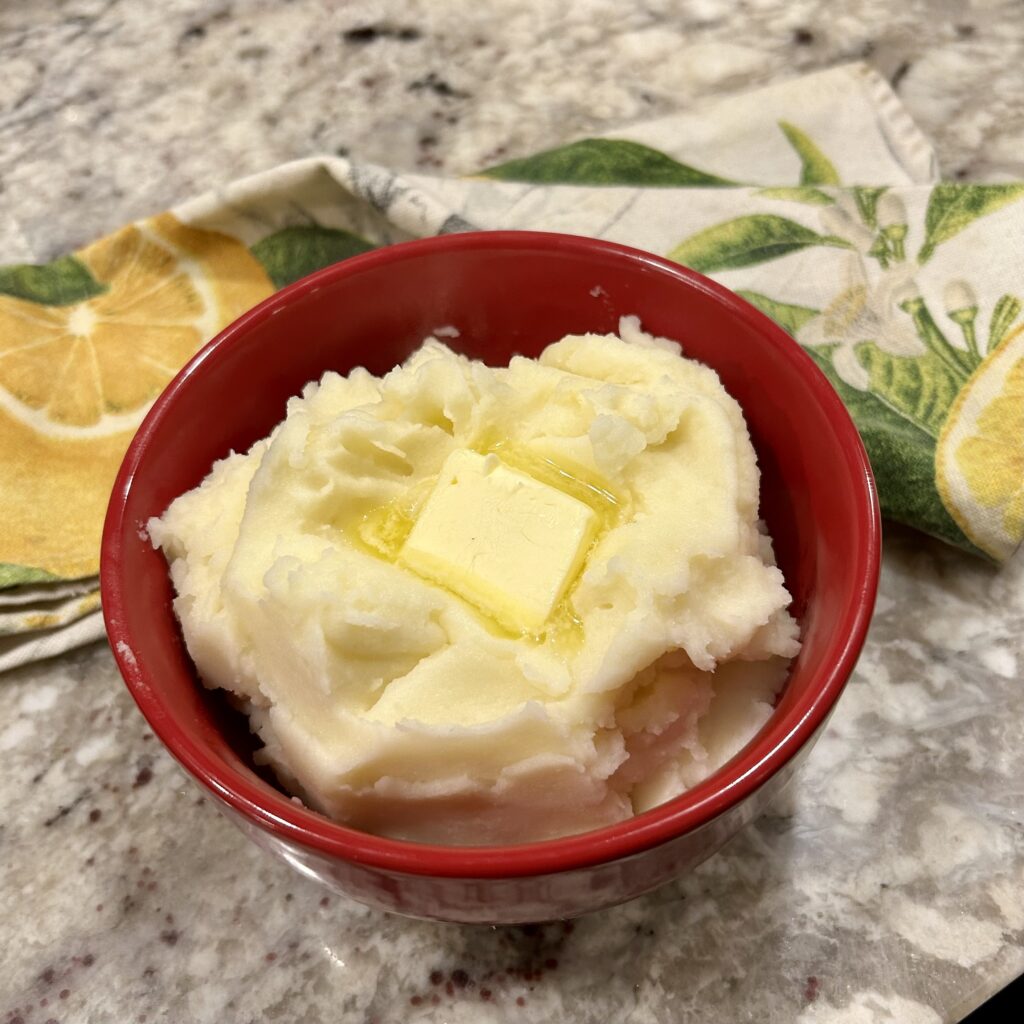
I’ve made mountains of mashed potatoes in my little life by faithfully adhering to the method I learned in cooking school. And I’ve always been reasonably happy with the results. But really, how far wrong can you go with potatoes, butter, and cream? Who cares if the mashed potatoes are a little lumpy or gluey? I do. So I set out a find a foolproof method for making smooth mashed potatoes.
First, I had to select the best potato. I had equally good results with russets and Yukon Golds. The russets (aka baking potatoes) are better at absorbing cream and butter. The Yukons (a cross between a baking and a boiling potato) were sweeter and more assertively potato-y.
In my research, one recommendation on cooking the spuds for maxiumum smoothness kept popping up: Boil them only halfway, then chill them completely before finishing the cooking process. Why? Because mashing a fully-cooked potato unleashes a ton of gummy starch. But if it’s cooked only halfway and then cooled, that starch becomes locked in and the finished product is much less gummy.
You can also cut down on the starch by washing the potatoes before you cook them. And if you steam the potatoes instead of boiling them, it’s much easier to chill them at the halfway point. You just lift out the steamer basket and run the potatoes under cold water.
I already knew that the best way to mash potatoes wasn’t to mash them at all, but to rice them with a ricer. It gets the job done, but more gently than a food mill or a hand masher. This gentleness helps to keep the starchiness to a minimum.
Whatever you do, do not reach for a food processor. It’s the tool I used to mash some potatoes exactly one time, before I knew any better. The potatoes were inedible were inedible, but on the plus side, they were so gluey I could’ve used them to put up wallpaper.
Start to finish: 50 minutes
Hands-on time: 15 minutes
Servings: 8
3 pounds russet or Yukon Gold potatoes
1/2 cup whole milk
1/2 cup heavy cream
1 teaspoon kosher salt
6 tablespoons unsalted butter, cut into pieces and softened
Freshly ground black pepper
Peel the potatoes and cut them into 1-inch chunks. As you peel and cut them, add the potatoes to a large bowl of cold water and swish them around to get rid of excess starch. Transfer the potato chunks to a large steamer insert and set the steamer over a pot of boiling water. Reduce the heat to medium and steam the potatoes, covered tightly, 10 minutes. Lift out the steamer insert, return the potatoes to the bowl filled with fresh cold water, and continue running cold water on top of the potatoes for a few minutes. Add several ice cubes and let the potatoes cool completely in the ice water. Drain the potatoes, return them back to the steamer insert, and steam, covered, until tender when pierced with the tip of a paring knife, 12 to 15 minutes.
Meanwhile, heat the milk and cream with the salt in a medium saucepan over medium heat until hot.
When the potatoes are tender, lift them out in the insert, and pour off the water from the bottom of the steamer. Transfer the potatoes to a ricer in batches and rice them while still hot back into the pot. Add the butter and stir until it is incorporated. (Putting the butter in first is key; it coats the potatoes with fat and prevents them from becoming gummy when you mix in the liquid.) Add the milk mixture and stir until incorporated. Add salt and pepper to taste and serve right away.
Make-Ahead Mashed Potatoes
Follow the procedure given for cooking the potatoes up the point of ricing the potatoes. Rice the potatoes directly into a large, microwave-safe bowl. Cover the bowl and chill until you are ready to finish the potatoes. Heat the milk and cream with the salt, and soften the butter. Microwave the riced potatoes, covering the bowl partially with plastic wrap, in 2-minute increments, stirring the potatoes each time, until they are very hot, then add the butter and milk mixture as instructed in the recipe.


